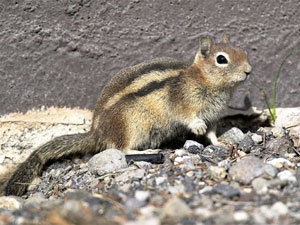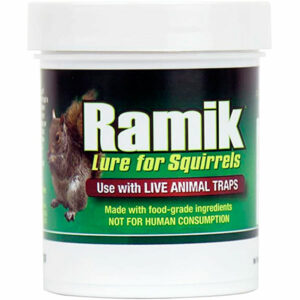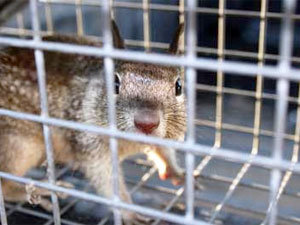While squirrels may look adorable scampering around collecting nuts, these clever rodents can become a serious nuisance in your garden. They dig through garden beds, destroy plants, steal vegetables, and unearth newly planted bulbs. In this comprehensive guide, we’ll explore effective and humane methods how to keep squirrels out of your garden and protect your plants from these persistent pests.
Quick Picks: Best Squirrel Repellents
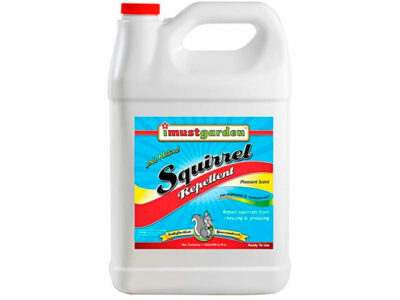
Editor’s Choice
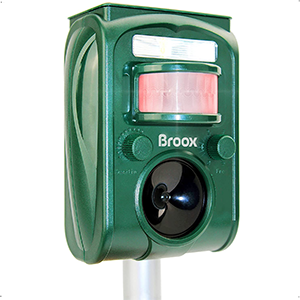
Best Electronic Option
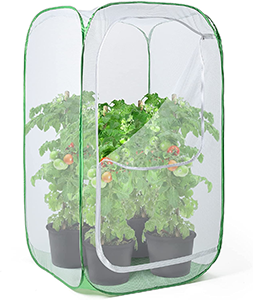
Best Physical Barrier
Identifying Squirrel Damage in the Garden
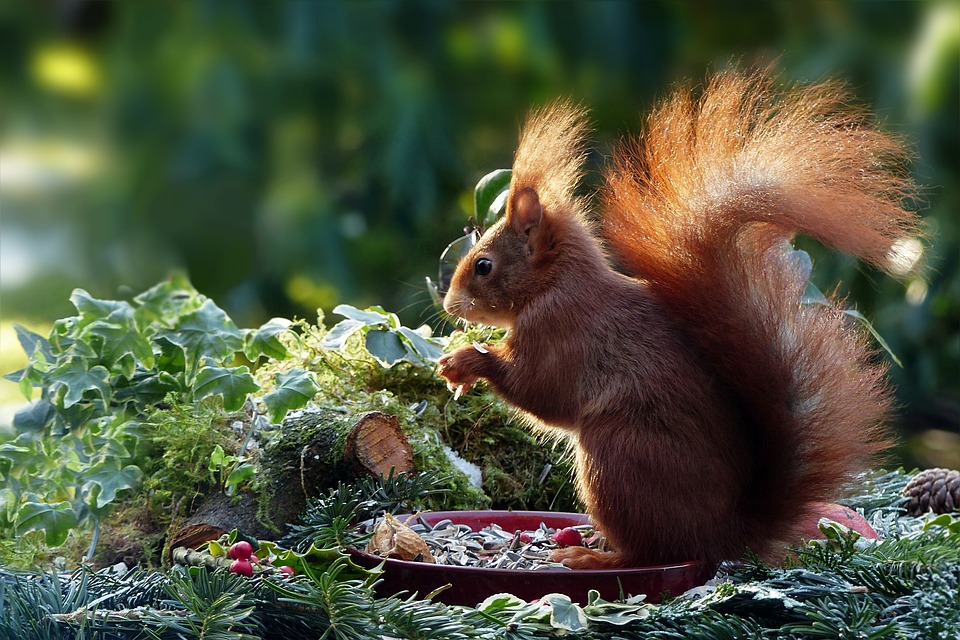
Before implementing deterrent methods, it’s important to confirm that squirrels are indeed the culprits damaging your garden. Here are the telltale signs:
- Soil Disruption Noticing disturbed soil or mulch in your garden beds is often the first sign of squirrel activity. While other animals like chipmunks or gophers can cause similar damage, most rodents respond to the same types of repellents.
- Missing Crops Squirrels visit gardens primarily in search of food. They readily consume tomatoes, peppers, cucumbers, berries, and even plant leaves. If your vegetables are disappearing or showing bite marks, squirrels may be to blame.
- Bulb Damage Squirrels are notorious for digging up flower bulbs. They either consume them directly or dig them up while creating storage caches for nuts and seeds they’ve collected.
- Bird Feeder Raids If you have bird feeders in your yard, squirrels will persistently attempt to steal the seeds. Repeated raids on bird feeders often indicate squirrels have established your yard as part of their territory.
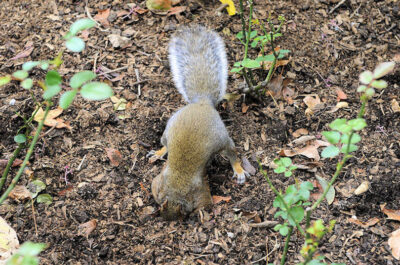
Squirrels frequently dig small holes in garden soil
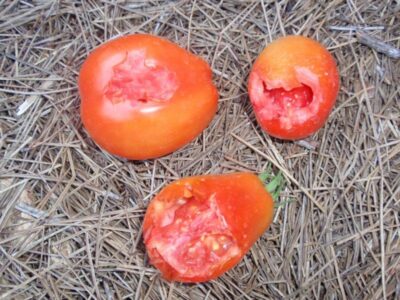
Partially eaten tomato – classic squirrel damage
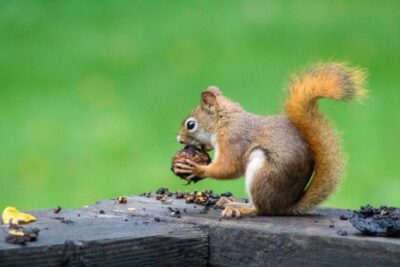
Unearthed flower bulbs are a common sign of squirrel activity
Effective Squirrel Repellents
There are several humane and effective ways to repel squirrels from your garden. These methods range from commercial products to natural solutions you can make at home.
Commercial Spray Repellents
Commercial spray repellents are one of the most convenient and effective solutions for deterring squirrels. These products typically contain natural ingredients that squirrels find unpleasant by smell, taste, or both.

I Must Garden Squirrel Repellent
- All-natural formula with essential oils
- Repels by both smell and taste
- Safe for people, pets, and plants
- No harsh chemicals or poisons
- Long-lasting protection
The I Must Garden Squirrel Repellent is our top recommendation for keeping squirrels out of your garden. This effective spray uses a proprietary blend of essential oils and natural ingredients that squirrels find repulsive, including:
1.25% Garlic
0.94% Castor Oil
0.47% Lemongrass Oil
0.31% White Pepper
0.23% Clove Oil
0.23% Cedarwood Oil
This repellent is eco-friendly and non-toxic, making it safe to use around your family and pets. Unlike many commercial products, it doesn’t produce unpleasant odors for humans while effectively deterring squirrels.
Electronic Repellents

Broox Solar Animal Repeller
- Solar-powered operation
- Motion-activated technology
- Ultrasonic sound emissions
- LED flashing lights
- Weather-resistant design
Electronic repellents use ultrasonic sound waves to deter squirrels and other wildlife. These devices emit high-frequency sounds that are uncomfortable for rodents but typically inaudible to humans. When the motion sensor detects activity, the device activates, creating an unwelcoming environment for squirrels.
If you have dogs, cats, or other pets, be sure to select electronic repellents that operate at frequencies above their hearing range to avoid causing them discomfort.
Natural Homemade Repellents
If you prefer a DIY approach, several natural repellents have proven effective against squirrels:
Hot Pepper Solutions
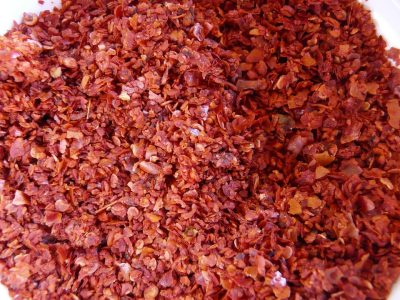
Squirrels have a strong aversion to capsaicin, the compound that gives peppers their heat. You can create an effective repellent by:
- Sprinkling cayenne pepper, crushed red pepper flakes, or ground chili peppers around vulnerable plants
- Mixing hot sauce or ground peppers with water in a spray bottle and applying to plants (test on a small area first to ensure no plant damage)
- Adding cayenne pepper to bird seed (birds cannot taste capsaicin, but squirrels can)
Always wear gloves when handling hot peppers and wash your hands thoroughly afterward. The capsaicin can cause irritation if it comes into contact with your eyes, nose, or mouth. For squirrels, while the pepper solution deters them, it can cause temporary discomfort but is not harmful long-term.
Peppermint Oil Spray
Peppermint oil has a strong scent that squirrels find repulsive. To make a peppermint repellent spray:
- Mix 10-15 drops of peppermint essential oil with 1 cup of water and 2 tablespoons of apple cider vinegar
- Pour the mixture into a spray bottle
- Apply to areas where squirrels are active, reapplying after rain or every 3-5 days
Predator Urine
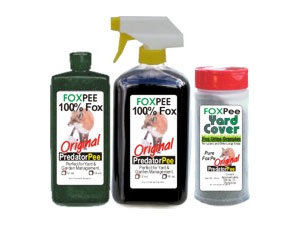
Squirrels have evolved to avoid areas where predators are present. Commercial products containing fox, coyote, or wolf urine can be extremely effective at creating the illusion of predator presence, triggering squirrels’ natural avoidance instincts.
Squirrel-Repelling Plants
Certain plants naturally deter squirrels due to their strong scents or other properties. Consider incorporating these squirrel-resistant plants into your garden:
- Daffodils
- Hyacinths
- Alliums (ornamental onions)
- Fritillaria
- Galanthus (snowdrops)
- Marigolds
- Nasturtiums
Plant these squirrel-repelling flowers around the perimeter of your garden or interspersed with vulnerable vegetables and bulbs for maximum protection.
Other Effective Deterrents
Motion-Activated Sprinklers
Motion-activated sprinklers provide a humane but startling deterrent for garden-invading squirrels. When the sensor detects movement, it triggers a sudden burst of water that frightens squirrels away without causing harm.
These devices are particularly effective because:
- They create an unpredictable deterrent that squirrels cannot easily adapt to
- They cover a wide area of protection
- They serve double-duty by watering your garden
- They’re completely harmless to wildlife and pets
Fake Predators
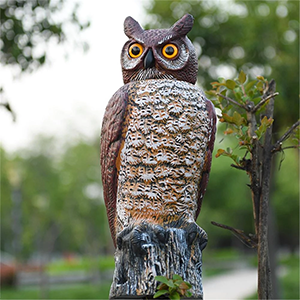
Decoys resembling natural predators can help keep squirrels away from your garden. Owl decoys are particularly effective, as owls are natural predators of squirrels. For best results:
- Move the decoy to different locations every few days to prevent squirrels from realizing it’s not real
- Choose decoys with reflective eyes or moving parts
- Combine with other repellent methods for increased effectiveness
Physical Barriers to Protect Your Garden
Sometimes the most effective way to keep squirrels out of your garden is to create physical barriers that prevent access altogether.
Protecting Individual Plants

Outdoor Mesh Plant Enclosure
- Pop-up design for easy setup
- Zippered door for easy access
- Durable mesh construction
- Protected growing environment
- Works for potted or in-ground plants
For protecting individual plants or small groups of plants, mesh enclosures provide an effective barrier against squirrels. These lightweight structures create a physical boundary while still allowing sunlight, air, and water to reach your plants.
Alternative options include:
- Wire cloches placed over individual plants
- Chicken wire domes secured around vulnerable plants
- Row covers for vegetable beds
Garden-Wide Protection
For larger gardens, consider these methods to create barriers around the entire growing area:
- Garden Fencing: Install hardware cloth or chicken wire fencing at least 30 inches high with an additional 6 inches buried underground to prevent digging
- Raised Beds with Protection: Build raised garden beds with attached frames that can support bird netting or hardware cloth covers
- Garden Tunnels: Create tunnel-shaped frames covered with mesh that protect entire rows or sections of your garden
For a cost-effective solution, create a simple frame using PVC pipes or wooden stakes around your garden bed. Attach chicken wire or bird netting over the frame, ensuring there are no gaps where squirrels could enter. Include a hinged section or removable panel for easy access when gardening.
When to Seek Professional Help
If you’ve tried multiple deterrent methods without success or are dealing with a severe squirrel problem, it may be time to consult professional wildlife removal services. These experts can assess the situation and implement effective solutions tailored to your needs. They are well-versed in various squirrel nest removal methods, ensuring that the problem is addressed thoroughly and safely. Additionally, they can provide preventative measures to help keep squirrels from returning in the future.
Professional exterminators can:
- Assess the extent of your squirrel problem
- Identify entry points and vulnerable areas in your garden
- Recommend and implement customized solutions
- Provide advice on long-term prevention strategies
- Use humane trapping and relocation methods when necessary
Before attempting to trap or relocate squirrels yourself, check local wildlife regulations. In many areas, trapping and relocating wildlife requires permits or may be prohibited altogether. Professional wildlife control operators will be familiar with local laws and can ensure all control methods are legal and humane.
Frequently Asked Questions
Is it legal to kill squirrels in my garden?
Laws regarding squirrel control vary by location. In many areas, killing squirrels requires permits or may be prohibited entirely, particularly for certain protected species. Always check your local and state wildlife regulations before considering lethal control methods.
Humane deterrents and exclusion methods are generally the recommended first approach and don’t require special permits.
Why do squirrels dig in my flower pots and garden beds?
Squirrels dig in garden soil and potting mix for several reasons:
- Searching for food (bulbs, seeds, nuts, insects)
- Burying nuts and seeds for later retrieval (caching)
- Creating nesting materials
- Natural foraging behavior
Adding a layer of decorative stones, pine cones, or rough mulch to the soil surface can discourage digging while still allowing water to reach plant roots.
Do ultrasonic repellers really work against squirrels?
Ultrasonic repellers can be effective against squirrels initially, but their effectiveness often diminishes over time as squirrels may become accustomed to the sound. For best results:
- Choose models with variable frequencies that change patterns
- Relocate the devices periodically
- Use ultrasonic repellers in combination with other deterrent methods
What crops are squirrels most attracted to?
Squirrels are particularly attracted to:
- Tree fruits (apples, peaches, plums)
- Berries (strawberries, blueberries)
- Corn (especially sweet corn)
- Tomatoes
- Squash and pumpkins
- Sunflowers and other plants with edible seeds
- Bulbs (tulips, crocuses)
These crops may require additional protection in areas with high squirrel activity.
How can I squirrel-proof my bird feeder?
To prevent squirrels from raiding bird feeders:
- Install a squirrel baffle above or below pole-mounted feeders
- Position feeders at least 10 feet away from jumping points like trees or structures
- Choose feeders with weight-activated mechanisms that close when heavier squirrels land on them
- Add cayenne pepper to bird seed (birds can’t taste it, but squirrels dislike it)
- Install dedicated squirrel feeding stations away from bird feeders to provide an alternative food source
Conclusion
Dealing with squirrels in your garden requires patience and typically a combination of approaches. Start with the least invasive methods—such as repellents and barriers—before considering more extreme measures. Remember that consistency is key; squirrels are persistent creatures, so your deterrent strategy should be equally persistent. If you find that squirrels are becoming a nuisance beyond your garden, such as invading your attic, you may need to explore more substantial solutions. Researching how to remove squirrels from attic spaces can offer insight into safe and effective methods. Additionally, sealing entry points and ensuring there are no food sources nearby will help prevent future intrusions.
For best results, rotate between different deterrent methods to prevent squirrels from becoming accustomed to any single approach. By implementing the techniques outlined in this guide, you can protect your garden while coexisting peacefully with local wildlife.
Consider offering an alternative food source far away from your garden to divert squirrels’ attention. A feeding station with corn, nuts, or sunflower seeds in a distant corner of your yard can redirect squirrels away from your prized plants while still allowing them to thrive in your local ecosystem.
